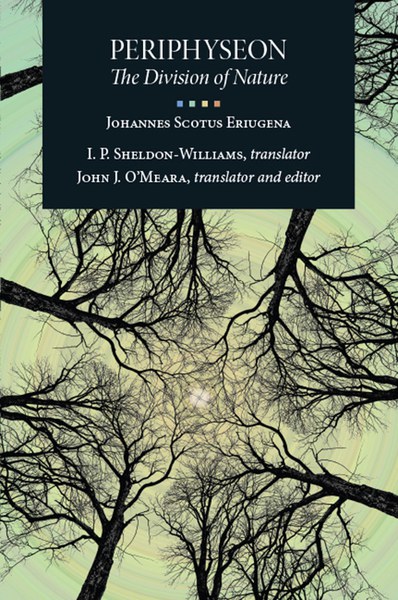By Joshua Robinson
The Periphyseon (On Nature), or De divisione naturae, as it is also known, is the masterwork of John Scotus Eriugena, the leading intellectual figure at the Carolingian court of Charles the Bald in the ninth century. John O’Meara’s translation, first published in 1987 and still the only complete English translation of this lengthy work, has long been extremely scarce; its recent reprinting will be warmly welcomed by scholars and students alike.
In a time when few in the Latin West could boast a knowledge of Greek, Eriugena distinguished himself by his acquaintance with several important Greek Fathers, most notably Gregory of Nyssa, Dionysius the Areopagite, and Maximos the Confessor. In the 820s, the Byzantine emperor had sent a complete manuscript of the works of Dionysius the Areopagite as a gift to Louis the Pious. It was deposited in the Abbey of Saint-Denis, whose abbot, Hilduin, produced the first Latin translation of this text. It was Eriugena, however, who understood Dionysius more profoundly, and thus produced a much more intelligible and faithful translation of the Dionysian corpus. Through this translation, as well as through his commentary on the Celestial Hierarchy, Eriugena played an important role in acquainting Latin Christendom with this important Greek authority, who subsequently became a major voice in the Latin tradition as well. Eriugena also translated Maximos the Confessor’s Ambigua and his Ad Thalassium, and when, a few years ago, Nicholas Constas produced an edition and translation of Maximos’s Ambigua for the Dumbarton Oaks Medieval Library, he relied in part on Eriugena’s translation, which predates the earliest surviving Greek manuscripts, for establishing the Greek text.
Eriugena not only translated these Greek authors, however, but also profoundly absorbed their thought into his own. The Periphyseon is thus a profound synthesis of Latin Augustinian and Boethian strands with several major Greek sources. The work is a lengthy dialogue in five books, structured primarily by a fourfold division of nature. The first book considers God as source, who creates but is not created. The second concerns the primordial causes, which are created and themselves create. The third book concerns the created universe. The fourth and fifth books concern God as end, who does not create and is not created. As even this cursory summary makes clear, the whole work traces the Neoplatonic structure of remaining, procession, and return. The Periphyseon is a bridge between Greek and Latin theological and philosophical currents that complements other Dumbarton Oaks publications, including Maximos’s Ambigua, already mentioned, John Magee’s edition and translation of Calcidius’s On Plato’s Timaeus, and volumes on Bernardus Silvestris and Alan of Lille.
Joshua Robinson is Byzantine Studies Librarian.


